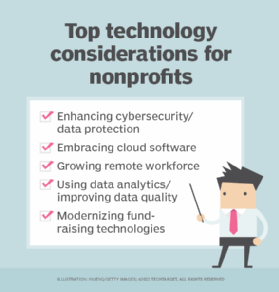nonprofit organization (NPO)
What is a nonprofit organization (NPO)?
A nonprofit organization (NPO) is one that is not driven by profit but by dedication to a given cause that is the target of all income beyond what it takes to run the organization.
Because of this, NPOs receive tax-exempt status from the federal government, meaning they don't have to pay income tax.
Nonprofit organizations are often used for trusts, cooperatives, advocacy, charity, environmental and religious groups. Many, but not all, NPOs have paid staff in management positions; almost all use volunteers.
Unlike for-profit businesses, NPOs have no owners and any surplus profits after operating expenses are used to further its goals instead of being distributed between members or employees of the organization.
What is the difference between an NPO and a not-for-profit organization?
Nonprofit and not-for-profit are both widely used to refer to NPOs but there are subtle differences.
The United States Internal Revenue Service (IRS), for example, uses not-for-profit to refer to activities like hobbies in which revenues are not involved.
What is the difference between an NPO and NGO?
The terms NPO and NGO (non-governmental organization) are also often used interchangeably but they have some key differences.
NGOs are separate from the government and require no government council but depend on the government for funding by means of government grants.
However, most NGOs are also nonprofit organizations and thus have nonprofit status.
How does an organization qualify for NPO status?
For a nonprofit corporation to qualify as a government-recognized and tax-exempt organization, it has to fulfill conditions set out by the internal revenue code. In the United States, the IRS determines the validity and tax status of NPOs.

These qualifications include the following:
- The organization must be created for religious, charitable, scientific, literary or educational purposes.
- The organization cannot be created for the benefit of any individual or private interests.
- The organization must have a governing body that is democratically elected.
- The organization must have bylaws in place that state its purpose and how it will be run.
Organizations that wish to be granted tax exemption must attest to these conditions and file the proper paperwork with the IRS.
What are some common use cases for NPOs?
There are many use cases for nonprofit organizations. Some examples include the following:
- advocacy organizations campaigning for public safety, social welfare, political change or some other social cause;
- charitable organizations working to alleviate poverty or provide relief in times of natural disasters;
- educational institutions such as schools and universities;
- environmental groups working to protect the planet and its resources; and
- religious organizations dedicated to spreading their faith.
Some of the more recognizable types of nonprofit organizations include the American Red Cross, Amnesty International and the United Way.
What is the benefit of NPOs to society?
Nonprofit organizations play an important role in society by working to improve the lives of others and the public good. They are often at the forefront of social change and provide much-needed services to those who are most vulnerable.
NPOs provide a way for individuals to pool their resources and skills to achieve common goals. They also offer employees an opportunity to use their talents for good, without being motivated solely by profit.
NPOs play an important role in democracy by holding powerful institutions and individuals accountable. They also help to ensure that everyone has a voice in the decisions that affect their lives.
In short, nonprofit organizations are a vital part of society as these types of organizations work to make the world a better place for all.
What are the challenges that NPOs face?
They often rely on the dedication of employees who believe in their cause because it's hard for them to compete with private-sector wages in lower-level and mid-management positions.
However, executive salaries are often quite high as a means of competing with equivalent positions in the private sector.
Fundraising and sponsorship can be an issue for nonprofits as well, as they often rely on external sources, such as donations.
Scrupulous accounting, transparency and accountability are essential to the continuation of operations, as mismanaged or misdirected funds could result in the loss of funding from both public and private sources and loss of status.
See also: HIMSS, ISSA, National Quality Forum, Cloud Security Alliance, Creative Commons, eHealth Initiative, ANSI, Center for Internet Security, IANA
